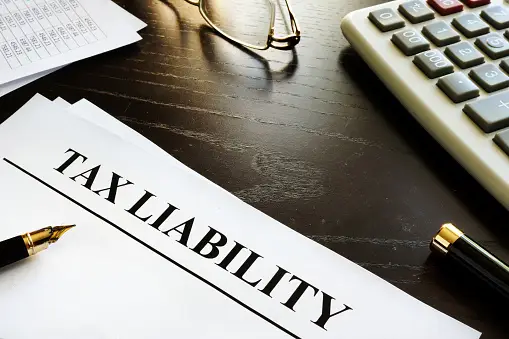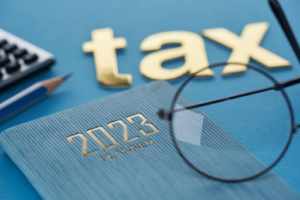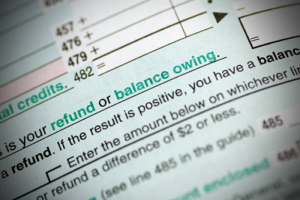- October 18, 2023
- Posted by: Marc Laguerrier
- Category: Blog

Navigating the complex world of taxes can be a daunting task. Yet, minimizing your tax liability is the secret fuel that propels you towards significant financial growth and security. Packing 20 years of experience into this revealing blog post, we’ll arm you with expert strategies to slice through the red tape around taxation. In strict adherence to legal guidelines, leap into our insider’s guide to a lean tax bill instead of letting hard-earned money slip away to unnecessary taxation. So buckle up and prepare to unlock the hidden potential behind rewriting your taxation narrative!
Tax liability refers to the amount of money that an individual or organization owes to the government in taxes at the end of each tax year. The amount of tax liability is based on a variety of factors, including income, deductions, credits, and other factors specific to each taxpayer’s situation. It is important to understand and plan for tax liability to avoid surprises during tax season. Strategies for reducing tax liability can include claiming eligible deductions, adjusting payroll exemptions, donating to charity (if itemizing deductions), and contributing to retirement accounts. A financial advisor or experienced tax professional can help optimize taxes for investing and retirement goals.
Effective Strategies for Minimizing Tax Liabilities
Tax season can often be a source of stress and anxiety for many individuals. However, with the right strategies in place, you can minimize your tax liabilities and potentially save a significant amount of money. Let’s explore some effective strategies that can help you navigate the world of taxes and maximize your savings.
First and foremost, strategic tax planning is essential. This involves carefully reviewing your financial situation and identifying opportunities to optimize your tax obligations. It’s crucial to stay informed about changes in tax laws and regulations that may impact your specific circumstances. Consulting with a qualified tax professional or financial advisor can provide valuable guidance tailored to your individual needs.
One key strategy to consider is maximizing deductions and credits. Take advantage of any available deductions for which you qualify, such as those related to homeownership, education expenses, medical costs, or self-employment. Additionally, explore potential tax credits that can directly reduce the amount you owe or increase your refund. These could include credits for energy-efficient home improvements or adopting a child.
Another effective approach is managing investments strategically. Evaluate whether it makes sense to hold onto investments for longer periods, as doing so may result in more favorable capital gains tax rates. Consider utilizing tax-advantaged accounts like IRAs (Individual Retirement Accounts) or 401(k)s (if available) to reduce taxable income while simultaneously preparing for retirement.
Additionally, structuring your assets wisely can help minimize taxes. Speak with financial professionals who specialize in estate planning to understand how proper asset allocation can safeguard more of your wealth from unnecessary taxation. For instance, certain types of trusts or gifting strategies may allow you to transfer assets to heirs while reducing estate taxes.
Lastly, don’t overlook the importance of maintaining accurate records and documentation. Keeping meticulous records of expenses, income statements, and relevant receipts will not only help you during tax filing but also protect you in the event of an audit. This practice ensures that you can substantiate any deductions or credits claimed.
Remember, minimizing tax liabilities requires careful planning, attention to detail, and staying up-to-date with current tax legislation. While this may initially seem overwhelming, the potential benefits are certainly worth the effort. Take advantage of these effective strategies to keep more of your hard-earned money in your pocket.
The Role of Charitable Contributions
Charitable contributions not only benefit causes you care about but can also play a significant role in minimizing your tax liabilities. Donating to qualified charitable organizations can provide both emotional fulfillment and potential tax advantages. Let’s explore how charitable contributions can positively impact your taxes and wealth management.
For instance, imagine that a family has an annual income of $100,000 and typically falls within the 25% tax bracket. If they donate $5,000 to a qualified charity, they would effectively reduce their taxable income to $95,000. As a result, they could potentially save $1,250 in taxes (25% of the $5,000 donation).
The IRS allows taxpayers who itemize deductions (rather than taking the standard deduction) to claim charitable donations as a deduction on their tax return. This means that the amount donated directly reduces the individual’s taxable income. However, it’s crucial to ensure that your donations align with IRS guidelines and that you keep proper documentation to substantiate your deductions.
It’s worth noting that donations don’t have to be limited to cash. Items such as clothing, furniture, or even appreciated assets like stocks or real estate can be donated to qualified organizations. In some cases, donating appreciated assets rather than selling them can offer additional tax benefits by avoiding capital gains tax on appreciation.
Beyond direct donations, other strategies exist for those with larger charitable intentions or high levels of wealth. Establishing a donor-advised fund allows individuals to make a sizable contribution and receive an immediate tax deduction, while retaining the flexibility to distribute funds over time. Charitable trusts and private foundations offer alternative structures for managing charitable giving while potentially reducing taxes on income or estate.
It’s important to remember that the primary purpose of charitable contributions should always be to make a positive impact. However, understanding the potential tax advantages can help amplify your philanthropic efforts and support causes that resonate with you.
Retirement Account Contributions
One of the most effective ways to minimize tax liability is by maximizing contributions to retirement accounts. Not only does this allow individuals to save for their golden years, but it also provides immediate tax benefits. By contributing to retirement accounts such as 401(k)s, traditional IRAs, or Roth IRAs, individuals can reduce their taxable income and potentially qualify for valuable tax deductions.
Let’s consider an example to illustrate the impact of retirement account contributions on tax liability. Sarah earns $60,000 per year and wants to lower her taxable income while saving for retirement. She decides to contribute the maximum allowed amount of $19,500 to her employer’s 401(k) plan. Thanks to this contribution, her taxable income reduces to $40,500. As a result, she falls into a lower tax bracket and effectively reduces her overall tax liability.
In addition to reducing taxable income, retirement account contributions come with other benefits as well. Contributions made to traditional IRAs and employer-sponsored plans like 401(k)s are generally tax-deductible in the year they are made. This means that individuals can deduct these contributions from their taxable income when filing their taxes, further reducing their overall tax liability.
Now that we understand the importance of retirement account contributions in minimizing tax liability let’s explore another strategy—utilizing legal deductions and credits.
Utilizing Legal Deductions and Credits
Utilizing legal deductions and credits is another effective approach to minimize tax liability. Deductions and credits can directly reduce the amount of taxes owed or increase the amount of refund received. It’s important for taxpayers to understand which deductions and credits they may qualify for in order to take full advantage of these opportunities.
Consider a conversation between two friends, Lisa and John:
Lisa: “I recently learned about the Child Tax Credit. It’s a great way to reduce our tax bill while providing for our children.”
John: “That’s interesting. I wonder if there are any other credits or deductions we might be missing out on.”
Lisa: “Definitely! There are several tax breaks available, such as the Earned Income Tax Credit, Education Tax Credits, and even credits for energy-efficient home improvements. We should explore these options to see if we qualify.”
Lisa and John’s conversation highlights the importance of being aware of the various deductions and credits available. These can include expenses related to education, health care, homeownership, or even energy-efficient upgrades to their home. By carefully documenting eligible expenses and meeting specific criteria, individuals can potentially save thousands of dollars in taxes.
It’s worth noting that tax laws change over time, so it’s crucial for taxpayers to stay informed about any updates or new deductions and credits introduced by the government. Consulting with a tax professional or financial advisor can provide valuable guidance on optimizing tax strategies and identifying all potential deductions and credits applicable to one’s unique situation.
Having explored the significance of utilizing legal deductions and credits in minimizing tax liability, let’s now discuss another aspect that small business owners may consider—the deduction for business expenses and home office.
Business Expenses and Home Office Deductions
When it comes to minimizing tax liability, understanding the nuances of business expenses and home office deductions can significantly impact your bottom line. By carefully documenting eligible expenses and optimizing your home workspace, you can potentially reduce your taxable income and maximize deductions.
To begin, it’s crucial to differentiate between personal expenses and those directly related to your business. Any expense that is ordinary and necessary for your trade or profession can generally be considered a deductible business expense. This might include costs such as office supplies, advertising, professional development, or travel expenses related to business activities. By tracking these expenses diligently throughout the year, you create a formidable arsenal of deductions come tax season.
Let’s say you’re a freelance graphic designer working from home. You decide to invest in a new computer for your work, which costs $2,000. Since this is essential to your business operations, you can deduct the full amount from your taxable income. As a result, you effectively save on taxes by reducing the amount subject to taxation.
Another key aspect of minimizing tax liability is taking advantage of home office deductions. If you use part of your home regularly and exclusively for your business activities, you may qualify for this deduction. By calculating the square footage of your home office space relative to the total area of your residence, you can determine what percentage of certain expenses related to your home (such as mortgage interest, rent, utilities) are eligible for deduction.
For instance, if you have a dedicated home office that occupies 10% of your living space, you can potentially deduct 10% of utilities and other relevant expenses on your tax return.
It’s worth noting that to claim the home office deduction, strict guidelines must be followed. The space must be used solely for your business and should be the principal place where you conduct important administrative or management tasks.
By being diligent in tracking business expenses and understanding the rules surrounding home office deductions, you can significantly reduce your tax liability and effectively allocate more resources towards growing your business.
Now that we have explored the importance of business expenses and home office deductions in minimizing tax liability, it’s crucial to discuss the role of financial advisors in this process.
Role of Financial Advisors in Reducing Taxes
Navigating the complex world of taxes can be overwhelming, especially for individuals with diverse financial portfolios or complex business structures. This is where financial advisors come into play. These professionals possess expertise in tax planning strategies, staying updated on current laws and regulations, and tailoring solutions to fit individual circumstances.
A capable financial advisor can conduct a comprehensive analysis of your financial situation, identifying potential areas where tax liabilities can be minimized. They can help devise strategies that take advantage of various deductions, available tax credits, and investment options that align with your long-term financial goals.
While it may seem tempting to rely solely on software or online tools for tax preparation, they often lack the personal touch of a professional. Financial advisors bring a level of knowledge that is difficult to replicate with automated software. They can provide personalized advice based on your unique circumstances, acting as partners as you navigate the complex realm of tax planning.
For instance, imagine you’re a small business owner with multiple streams of revenue and significant investments. Without a dedicated financial advisor, you might find it challenging to optimize your taxes fully. However, by collaborating with an experienced professional who understands the nuances of your situation, you can devise a strategic plan that minimizes tax liabilities while maximizing growth opportunities.
Moreover, financial advisors can guide you through changing tax laws and evolving regulations. They are adept at identifying potential red flags or audit triggers that could land you in hot water with the IRS. By keeping abreast of the latest developments in taxation policies, these experts ensure that your strategies remain compliant and up to date.
Think of a financial advisor as your co-pilot, helping you navigate the intricate terrain of taxes while keeping an eye on your long-term financial objectives. They provide valuable insights, helping you make informed decisions and optimizing your tax efficiency along the way.
- Financial advisors possess expertise in tax planning strategies and can provide personalized advice based on an individual’s unique financial circumstances. They can help minimize tax liabilities, identify potential growth opportunities, and guide individuals through changing tax laws and evolving regulations. Collaborating with a financial advisor can provide invaluable insights and ensure strategies remain compliant and up to date, helping individuals navigate the complex world of taxes while pursuing their long-term financial goals.
Avoidance of Tax Penalties with Timely Filing and Payments
As tax season approaches, it’s crucial to understand the importance of timely filing and payments to avoid unnecessary penalties. The IRS imposes penalties for both late filing and late payment, which can quickly accumulate and increase your overall tax liability. By staying organized, planning ahead, and adhering to deadlines, you can minimize these penalties and keep more money in your pocket.
When it comes to filing your taxes, the deadline for most Americans is April 18th in 2023. However, it’s essential to note that some states and areas affected by disasters may have different filing deadlines. States like California, Alabama, Georgia, and Mississippi often have extended deadlines due to various circumstances. It’s vital to be aware of any exceptions or extensions specific to your location.
To avoid late filing penalties, it is crucial to file your tax return on time or request an extension if needed. Failing to file on time can result in a penalty of 5% of the unpaid tax amount per month, up to a maximum of 25%. This penalty can add up quickly if left unresolved, making it essential to prioritize timely filing.
Timely payments are just as critical as timely filing when it comes to minimizing tax penalties. If you owe taxes but fail to pay by the due date, you could incur late payment penalties. These penalties typically amount to 0.5% of the unpaid tax balance per month and can also reach a maximum of 25% over time.
It’s important to remember that even if you cannot afford to pay your full tax liability immediately, it’s better to file your return on time and explore other options for payment rather than avoiding filing altogether. By doing so, you can avoid the additional late filing penalty while working towards resolving your outstanding balance.
Let’s consider a scenario where you’re unable to pay your full tax liability on time. In this case, the IRS offers various options to help you manage your payments. One such option is an installment agreement, which allows you to make monthly payments over time. By setting up an installment plan with the IRS, you can avoid paying a significant sum all at once and mitigate the risk of incurring substantial late payment penalties.
Additionally, if you expect to receive a tax refund but haven’t filed your return yet, it’s essential to submit it promptly. Filing your return early not only ensures that you receive any potential refund sooner but also eliminates the possibility of late filing penalties.
By prioritizing timely filing and payment of your taxes, you can minimize tax penalties and the overall burden on your finances. Staying organized, understanding the deadlines specific to your situation, and seeking assistance or payment options when needed are key strategies for success in managing your tax liability effectively.
Maximize Your Refund, Minimize Your Stress: Americ Tax – Your Path to the Best Tax Preparation and Bigger Returns
Elevate your tax season experience and unlock the full potential of your tax refund with Americ Tax Services, where excellence meets efficiency in tax preparation. Nestled within the virtual corridors of Americ Tax Services, our platform is not just a place for number crunching—it’s your gateway to maximizing your returns and securing financial peace of mind. Whether you’re an individual navigating the labyrinth of deductions or a business owner aiming to optimize your financial strategy, Americ Tax Servicesis your trusted partner in achieving the best outcomes for your tax refund.
What sets Americ Tax apart is our unwavering commitment to delivering results that go beyond expectations. Our team of seasoned tax experts is dedicated to staying ahead of the curve, ensuring that you benefit from the latest tax laws, credits, and deductions available. We understand that each financial journey is unique, and that’s why our approach is personalized to your specific needs. Americ Tax isn’t just about filing taxes; it’s about empowering you with financial knowledge and strategies that can shape a brighter financial future.
Navigate the tax season with confidence and ease by choosing Americ Tax. Our user-friendly platform ensures a seamless experience, allowing you to focus on what matters while we handle the intricacies of tax preparation. Visit https://americtax.com/ today and discover the unparalleled expertise that awaits you. Let Americ Tax be your guide to a stress-free and rewarding tax refund journey. Book an Appointment today —because you deserve the best. Your financial success is just a click away!








